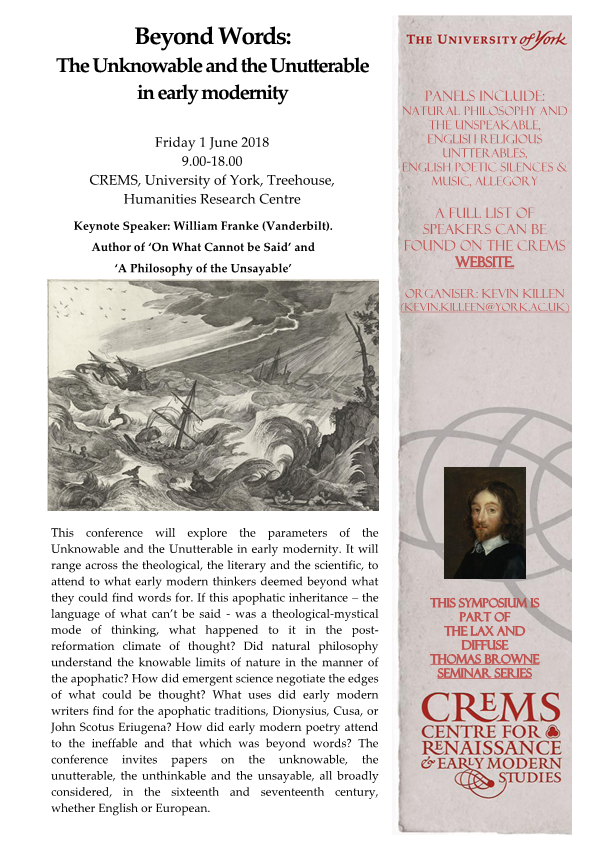York Conference – Beyond Words
Posted by frankewp on Saturday, March 31, 2018 in News.
Beyond Words: The Unknowable and the Unutterable in early modernity
Posted on 4 June 2018
His talk addresses one of the most important figures on the cusp of the Renaissance, Nicolas of Cusa, and how his apophatic ideas – the language of what can’t be said– emerged in concert with the artistic and scientific thought of the era.
The talk was the culmination of a day of papers that spoke to natural philosophy, music, poetics and the theological in early modern thought in relation to the apophatic. The full programme can be found Here. The conference was part of the annual Thomas Browne Seminar.
Video Recording with Introduction and Question/Answers
Centre for Renaissance and Early Modern Studies
Beyond Words: The Unknowable and the Unutterable in Early Modernity
Friday 1 June 2018, 9.00AM to 18:00
Speaker: (keynote) William Franke (Vanderbilt) Author of ‘On What Cannot be Said’ and ‘A Philosophy of the Unsayable’ (among others).
This conference will explore the parameters of the Unknowable and the Unutterable in early modernity. It will range across the theological, the literary and the scientific, to attend to what early modern thinkers deemed beyond what they could find words for. If this apophatic inheritance – the language of what can’t be said – was a theological-mystical mode of thinking, what happened to it in the post-reformation climate of thought? Did natural philosophy understand the knowable limits of nature in the manner of the apophatic? How did emergent science negotiate the edges of what could be thought? What uses did early modern writers find for the apophatic traditions, Dionysius, Cusa, or John Scotus Eriugena? How did early modern poetry attend to the ineffable and that which was beyond words? The conference invites papers on the unknowable, the unutterable, the unthinkable and the unsayable, all broadly considered, in the sixteenth and seventeenth century, whether English or European.
This symposium is part of the lax and diffuse Thomas Browne Seminar series.
Programme:
Natural philosophy and the unspeakable
Allegra Baggio Corradi (Warburg), The leksikon fantastikon of Niccolò Leonico Tomeo: The notion of halitus between natural science and divination
Yvonne Kiddle (University of Western Australia), Encountering the Deity through His Works: Bacon, the Apophatic and the Emergent Science.
Kevin Tracey (Science Museum), Point not only in respect of the Heavens above us, but of that (…) Celestial Part within us’: Negotiating Early Modern Cosmography through Books and Instruments
English Religious untterables
David Manning (Leicester), Some Remnants of Pseudo-Dionysius? Rethinking Henry Hammond’s Practical Divinity
Mathilde Zeeman (York), Lancelot Andrewes and the apophatic
Kevin Killeen (York), The Jobean Apophatic and the symphonic unknowability of the world
English poetic silences
Chance Woods (Vanderbilt University), The Apophatic Baroque: Poetry as Negative Theology in Angelus Silesius and Richard Crashaw
Travis Williams (University of Rhode Island), Unspeakable Creation: Writing in Paradise Lost and Early Modern Mathematics
Rosie Paice (Portsmouth), ‘Lik’ning spiritual to corporal forms’: translation as theme and event in Paradise Lost
Music, Allegory
Julie R. Klein (Villanova), How to Move beyond Language
Jelle Kalsbeek (Warburg), Isaac Beeckman and musical apophatic
Nika Kochekovskaya (Higher School of Economics, Moscow), Allegory as an expression of the unutterable in early modern literature: case of M.K. Sarbiewski (1594-1645)
Keynote speaker: William Franke (Vanderbilt), Paths Beyond Words: The Ways of Unsaying in Early Modernity
Location: The Treehouse, Berrick Saul Building, University of York
Admission: Registration details to follow soon.
Email: crems-enquiries@york.ac.uk



©2026 Vanderbilt University ·
Site Development: University Web Communications